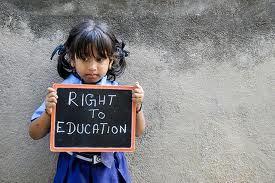
At the end of the RTE document being notified by the state government are forms to be filled by the schools addressed to the Deputy Director of Public Instructions (DDPI) in order to get them ‘recognised’. It has been clearly specified in Condition No. 5 of Form 2 that: “The society/ school shall not collect any capitation fee or voluntary donations from the parents of children at any time either during admission or during the course of the academic year. The school shall collect only tuition fee and other fee as approved by the department”.
The condition also demands the school to notify the scale of fee and “display prominently in school premises”.
Strict guidelines against collection of donations by schools had been specified in the Act passed by the central government in 2009 itself. According to the Chapter IV, Section 13 (1) of the Act, “No school or person shall, while admitting a child, collect any capitation fee and subject the child or his parents or any guardian to any screening procedure”. The Act defines ‘Capitation Fee’ as “any kind of donation or contribution or payment other than the fee notified by the school”. Besides, according to the Act Section 13 (2)(a), if a school collects capitation fee from the students, it “shall be punishable with fine which may extend to ten times the capitation fee charged”.
But the word ‘voluntary donations’ finds a specific mention in the state government notification clearly stating that no such donations could be taken from parents by the schools at the time of admission or during the course of the academic year.
Most private schools are alleged of minting money in the form of donations and treating education like a business activity. Such schools are likely to be irked by Condition No. 15 of the Form notified by the state government which states that: “The school shall not be run for profit to any individual or group or association of persons”.
Speaking to Coastaldigest.com, Fr. Clifford Sequeira, Correspondent, St Aloysius Primary School, said: “People say that our management mints money and so on. As far as our institution is concerned, whatever is earned is ploughed back into the institution in terms of developing infrastructure and providing better facilities and study environment to the students. Besides, it is our well-wishers and alumni that we depend on to collect funds for the school”, he says.
Renni D’Souza, education activist, however feels that schools must be specific in their source of collection of funds. “If schools say that they collect money from outsiders then they can do so. As long as they collect money from well-wishers and others it is fine but they cannot charge anything from the parents. The Act is very clear when it states that no donation can be charged from parents during admission and during the course of the academic year”.
Prof. M B Puranik, President of Tulunadu Education Trust which runs Sharada Vidyalaya school feels that the RTE Act as a whole itself is an attempt by the government to interfere in private schooling administration and that it is not right on its part to interfere in its fee structure.
The state government notification has also specified in the following condition i.e. Condition No. 16 that the accounts of the school must be audited by a Chartered Accountant and a copy of such audited statements must be sent to the DDPI/BEO by the end of June every year.
Besides, those schools which come under the category wherein they are required to accommodate 25% of children from weaker sections, have been instructed by the Act to open and maintain a separate bank account for receipt of reimbursement amount from the government, as per Condition No. 4 of the Form. The bank account is to be subject to audit by the Department, as well.




Comments
Add new comment